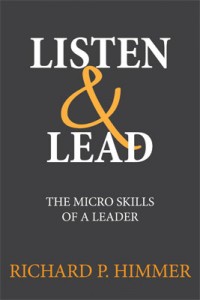My new book: Listen & Lead: The Micro Skills of a Leader is arriving by mail today. Last night I updated this blog from a year ago because my son Scott’s Mission President is asking questions about Ted and Ting and my book. The Micro Skills of being a leader or a sales professional are identical with being an effective missionary. This is a gospel introduction to the principles taught in my book. 
Here are two chapters from the book to sample. If you want to order it, click here. Tomorrow is the final day for preorders at a discount ($5.00 off).
Power vs. Control
When teaching the gospel, he who asks the questions is in control. She who is being questioned has the power. This allows the Holy Ghost to work in harmony with the missionary (teacher). The Holy Ghost will do the heavy lifting when you, as the teacher, give permission to the investigator to think and express an opinion without fear of judgment.
Think about the last time you met a persuasive salesperson or missionary. Did you have permission to say no? Were your opinions, thoughts, and desires truly sought? Were they considered and honored? If no, did you feel trust towards that person?
A communication Blind Spot is asking questions and then taking the power away from the respondent to answer in truth. It is asking rhetorical questions that lead the investigator to the answer you want or expect. It is manipulating the space and overcoming objections with arguments from your perspective.
Salespeople often use these techniques to close the sale and as a profession rank as one of the least trusted in the United States. Lawyers and politicians round out the top three. They all share the same tactics for getting their way: persuasion, manipulation, and overcoming objections.
To be effective and develop emotional intimacy (mutual trust and respect) with someone, a missionary must relinquish power. There is a constant urge to answer and make decisions on behalf of the investigator, but having the ability to be neutral, without expecting their answers to be in harmony with what you want, will empower them with confidence and trust.
A common fear among missionaries is hearing an investigator say “no.” To avoid hearing the dreaded “no” missionaries and salespeople talk more, even to the point of answering their own questions, assuming if they talk enough, their brilliance will be manifested and the investigator will submit to their wishes.
The power of the Spirit is compromised when persuasion and manipulation are employed, which removes the agency of the investigator. Assuming “the field is white already to harvest” where is the faith in a missionary who fears someone expressing their opinion? Does this behavior respect the gift of agency?
The most productive space between two people is emotional intimacy, or mutual trust and respect, which are integral aspects of charity. As a missionary of the Lord Jesus Christ, you are sent to preach the gospel, not to force the gospel into the lives of people because they need it. Developing emotional intimacy is critical for the presence of the Spirit and the whisperings of the still small voice.
Control in a gospel discussion is manifested only over the direction of the conversation and not over the investigator. Controlling the direction of a conversation is orchestrating a space of neutrality between you and the investigator, while inviting the Spirit to confirm the message.
Some missionaries serve because of family pressure, while others truly feel called. Those who are persuaded to serve, struggle until they receive their own witness, or endure the mission filled with mediocrity, counting the days. However, those who feel the sweet invitations of the Spirit are uplifted, strengthened, and pursue a life of service that brings joy and happiness.
When a missionary uses manipulation or persuasion to influence an investigator to read the Book of Mormon, to attend church, or to make a baptismal commitment, he removes the ability for the investigator to say no.
An investigator can never say yes until she can say no.
Most people, when trying to be persuasive, feel the need to take both positions during the conversation. The first position is control and the second position is power.
The most productive missionaries use emotional intimacy as a foundation for teaching the gospel. It is primary in their approach. The Lord’s chosen understand that trust is a key ingredient to success; in fact it’s a currency.
Missionaries are called to teach and teaching is delegating learning to the investigator. Learning is the process of self-discovery. Teaching is an invitation to feel the Spirit.
Telling is practicing the tactics of persuasion and manipulation, it is a monologue, and the primary reason marriages fail, children disobey, and why investigators rarely keep their commitments.
Telling is a transfer of what you want, teaching is identifying what they want. How would you want to be treated?
Teaching invites the investigator to share safe space that develops mutual trust and respect, where the Spirit does all the persuading, and the investigator willingly makes the decision to accept the blessings of the gospel.
God created man to act for himself, Lucifer wanted man to be acted upon. One invites openness and freedom of thought, the other removes the freedom and manipulates the person.

I can’t wait to get my copy. I read the two preview chapters to three of my boys as we traveled home from Bountiful, Ut. The chapters provided a fun springboard for discussion. Thanks for sharing your insights!
Thank you. It helps to have wonderful boys who have learned how to listen.
rph